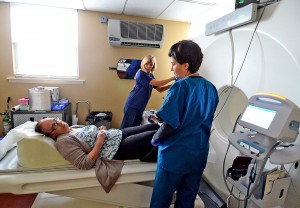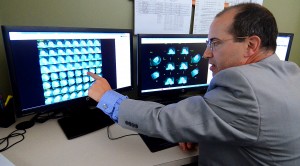Heart House News

Getting to the Heart of the Matter
By Rita Manno
Burlington County Times | September 3, 2013
 Dr. Sanford Gips of Moorestown, managing partner at the Heart House in Haddon Heights, contacts a patient concerning the results of a PET scan. |
The tons of gleaming silver tube in the small room holds promise for many patients at the Heart House, who come here for cardiac testing and diagnosis. They know the testing will be accurate and if there is cardiac disease, it will be found.
All of this is the result of the Positron Emission Tomography (PET) scanner, the only one in the South Jersey region for cardiac nuclear stress testing. In a room full of computers next to the scan, physicians can see the patient's heart muscles while the patient is in the scanner, and then apply formulas to analyze the results.
This diagnostic tool has a 90 percent accuracy rating for identifying coronary artery disease. It also takes half as much time and less radiation as a traditional nuclear stress test. The patient gets the results the next day.
"When you use conventional tools like a treadmill for a stress test or older nuclear scans, it will only pick up heart disease 65 percent of the time. That means there's a 35 percent chance it'll miss it," said Dr. Sanford Gips, a Moorestown resident who is the managing partner at the Heart House, which is in Haddon Heights, Camden County.
 Getting a PET scan at the Heart House in Haddon Heights is Florence McDevitt, as nuclear medicine technician Cathy Wegner sets the unit and nurse Michelle Piotrowski talks to her. |
With the PET nuclear stress scanner, physicians are better able to detect which areas of the heart are receiving adequate blood supplies and with a 90 percent accuracy rate, the PET scanner produces fewer false positives which lead to unnecessary cardiac catherizations.
The PET scanner can also show if there is heart damage or scar tissue in the heart.
"The PET scanning provides greater insight into a patient's condition and allows our physicians to make more informed decisions about their care," said Gips.
On a recent day, Florence McDevitt of Lindenwold is preparing for the PET nuclear stress testing scanner. At age 74, McDevitt is getting a pre-surgery clearance for her heart to make sure there is no blockage. She will undergo surgery for lung cancer.
"I've had scans before but this is a lot quicker," said the mother of three who has 26 grandchildren and great grandchildren. Patients are usually in the PET scanner for 40 minutes.
 Dr. Sanford Gips of Moorestown, managing partner at the Heart House in Haddon Heights, contacts a patient concerning the results of a PET scan. |
By eliminating the need to walk on a treadmill, the nuclear stress test is best for the disabled, the elderly and individuals with limited mobility. Gips said it is also ideal for people who are obese.
Since March when the Heart House cardiac practice got the new PET scanner, 413 patients, sometimes seven a day, have been scanned, said Suzanne Parker, lead technologist/technical director at Heart House.
Gips hopes that as more people use the new technology more insurance companies will cover the testing. A treadmill stress test usually costs $200; a stress echo test $600 and the new PET nuclear stress test $1,000.
The Heart House, the largest independent cardiology practice in South Jersey, has locations in Haddon Heights; Cherry Hill; Washington Township, Gloucester County; and Elmer. A new office in Evesham is opening soon. Heart House has 27 board-certified cardiologists and a staff of nurse practitioners, nuclear technologists and other health care professionals. For more information, visit http://hearthousenj.com.
[To read this article online, follow this link.]